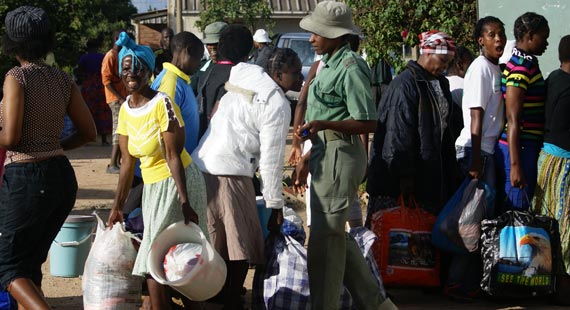
THE Zimbabwe Prisons and Correctional Services (ZPCS) has been forced to halt its recruitment drive due to funding constraints. ZPCS was forced to abort its planned recruitment of people to train as prison wardens in February. NQOBANI NDLOVU STAFF REPORTER
While the ZPCS has suspended recruitment of trainee prison wardens, the Zimbabwe National Army (ZNA) and Air Force of Zimbabwe are continuing to recruit trainee soldiers and air personnel.
ZPCS chief prison officer Simon Kaondo on Tuesday said the prisons’ body would only start recruiting new prison guards once funding was made available.
“At the moment, there is no recruitment exercise going on as funds have not been made available,” Kaondo told Southern Eye at the ZPCS stand at the Zimbabwe International Trade Fair.
In the 2014 national budget, ZPCS was allocated $2,5 million compared to the $21 million it had requested for.
Underfunding has always battered the ZPCS resulting in it suffering severe fuel shortages and failing to transport prisoners to courts.
Food shortages have also affected the organisation and prison officials told Parliament late last year that over 100 convicts died due to hunger-related deaths.
About $1,2 million is reportedly required monthly to feed prisoners countrywide, but the ZPCS is only getting about $300 000.
- Chamisa under fire over US$120K donation
- Mavhunga puts DeMbare into Chibuku quarterfinals
- Pension funds bet on Cabora Bassa oilfields
- Councils defy govt fire tender directive
Keep Reading
According to Kaondo, there are close to 11 000 prison guards, a figure he said was far less than the ZPCS requirement of more than 15 000 personnel.
“We were supposed to recruit in February, but due to the unavailability of funds the exercise was put on hold. We are not yet sure as to when we will have the next exercise,” Kaondo added.
Humanitarian organisations and human rights groups blame the paucity and poor quality of prison food on the general underfunding of prisons.
The Zimbabwe Association of Crime Prevention and Rehabilitation of Offenders and the International Committee of the Red Cross had to intervene in 2009 to save prisoners from starvation.










